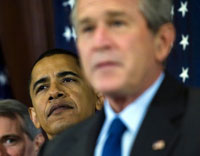The Rewards of Loyalty
By Hans Vogel

When Obama assumes as 44th president, the problems facing him will be immense, even more so than the ones facing Bush II today. On the domestic and economic fronts, it is to be doubted if the new incumbent will have the means to effect anything resembling a coherent policy. Quite likely, like most so-called decision makers today, he will be pulled along by events, but try to make it look as if he is in control. There is only one area where the new ruler will have some margin for maneuvering: foreign policy. There will not, however, be a major change in US foreign policy. It will proceed along lines set out by earlier administrations, especially the Bush II administration.
Like his immediate predecessors, Obama has already and repeatedly affirmed his unconditional loyalty to the state of Israel, stating its continued existence to be a “vital interest” of the United States. Hence it is clear that the special relationship with Israel will be a cornerstone of US foreign policy, like it has been since the Six-Day-War of 1967. Further US support for Israel will continue creating anger, confusion and frustration in the entire Muslim world. Nor will the Palestinian question thus be brought nearer a solution.
Like Bush II, Obama has been warning Iran not to pursue its nuclear project any further, threatening the use of force to prevent it. For some years now, the US administration has been claiming Iran is trying to get the technology and the materials to build nuclear weapons. There is, of course, not a single shred of evidence for this assertion, but by repeating it over and over, it has gained some sort of truth-like validity. A lie masquerading as truth. Amid the persistent stream of rumors as to US and/or Israeli plans to destroy Iranian nuclear installations by military action “before it is too late,” a disturbing question springs to mind: what are the true US policy objectives?
Seen in the longer term, it is understandable the US does not wish to see a major country like Iran in the possession of nuclear weapons. Any Middle Eastern state with a nuclear capability would be a serious competitor for US interests in the region. Then what about Israel, with its widely acknowledged nuclear capability? Is it not also, like a hypothetically nuclear Iran, a threat to US interests? Well, of course it is, just like Iran would be! If the US wants to prevent Iran from going nuclear, why is it not acting against Israel? Who says it is not doing so already, despite all public assertions to the contrary? As a matter of fact, all these public reassurances with regard to Israel may actually be interpreted as a kind of smokesecreen to hide what is really going on.
If for the moment, US and Israeli diplomacy appears to run on parallel tracks, it would be wrong to assume it would remain so forever. The US has global interests, Israel is chiefly interested in survival, at all cost. Sooner or later, these diverging interests must inevitably clash. Under the surface therefore, Israel is as harmful to US interests as Iran. By stoking up the mutual fear between Israel and Iran, the US is creating a climate in which each of these two countries may eventually be willing to risk a war to eliminate the other. It would be a masterful stroke of diplomatic intrigue if the US could get both to spontaneously wipe out each other, thus helping the US to get rid of its two major competitors in the region. At the same time, the Palestinian question would be solved, either because Palestine would have been immolated in a WMD attack, or because the state of Israel would cease to exist.
Coincidentally, US diplomacy in South Asia already fits this pattern, clearly visible after the recent Bombay incidents. TheUS has immediately sided with India in accusing Pakistan of masterminding the incidents, while the actual evidence supporting this claim is flimsy, if not totally contradictory. Meanwhile, tensions between India and Pakistan are at a breaking point.
Since the destruction of the WTC towers in 2001 Pakistan, a US ally for over fifty years, is being subjected to a coordinated US destabilization campaign. Pakistani president Zardari, like his predecessor Musharraf was installed and supported by the US. The Pakistani intelligence agency ISI is regarded by many as a CIA dependency. US forces operating from Afghanistan have been stepping up bombing raids against targets inside Pakistan, routinely killing and maiming hundreds of people. A major side effect of this campaign has been to discredit the Islamabad regime, which is evidently unable to safeguard national sovereignty. With the blame for the Bombay events being thrown at Pakistan by both India and the US, the regime is brought further under pressure. After the ratification of the controversial US-Indian nuclear cooperation agreement in 2008, it is obvious the US has decided to switch alliances and side with India. Pakistan is an example of a faithful US ally being ruthlessly sacrificed in order to serve some other US foreign policy objective. Why could not the same fate befall Israel?
Something similar is also taking place with respect to US-British relations. The original “special relationship,” with Britain, after steadily losing significance and relevance, has become so fragile that Gordon Brown is now frantically trying to resuscitate it. The British have indeed reason to be apprehensive. Since Sarkozy was elected president, France has been drawing ever closer to the US. There are even rumors that Sarkozy, who has family ties to the highest echelons of the US intelligence community, really is a CIA or Mossad agent posing as France's head of state. At any rate, these days it is the French attitude, rather than the British one, that is finding approval in the US. Whereas Britain is withdrawing its troops from Iraq and dragging its feet sending more to Afghanistan, Sarkozy has eagerly promised to beef up the French military presence in Afghanistan. Moreover, many in the French foreign policy establishment today are hoping their country will substitute Britain in a special relationship with the US. The French are prepared, for they have been quite busy learning English over the past decades.
In two key areas on which its foreign policy is focused, the US is now switching alliances. This may be an indication of an overall change taking place in Washington's foreign policy. One should not forget that great powers and empires weaken themselves if they bind themselves too closely to any one “ally” for too long a time. Empires must therefore reconsider their alliances from time to time. Besides, power is always more effective if it carries an element of unpredictability. Like on the work floor, the friend of the boss has a priviliged, but ultimately fragile position. His friendship with the boss isolates him from his colleagues. Among states, fundamentally the same principles apply. Hence the question of why Israel should escape the fate of Pakistan and Britain?
Thus is the reality of politics where, to paraphrase Charles de Gaulle, “nations do not have friends, they only have interests.” Moreover, it may be difficult to have an independent foreign policy, but it is far more difficult to be the vassal state of an empire and to abandon oneself to the whims of the far away imperial capital. There may be a few certainties, but far more unpleasant surprises. In the end, one is always, always betrayed, for in the long run, loyalty in foreign policy carries only dubious rewards.
Subscribe to Pravda.Ru Telegram channel, Facebook, RSS!




